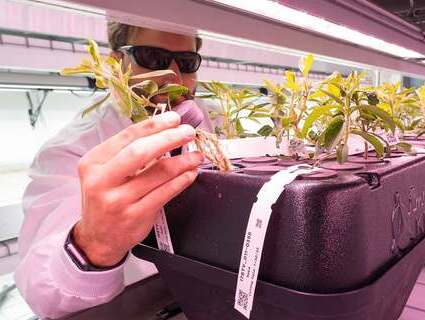Leading the way: Removing trans-fatty acids from our food supply
Read Time: 5 minutes
February 01, 2024
In late 2017, Jiahe Foods — China’s largest manufacturer of milk tea creamer — was looking toward the future.
Market trends showed a rising interest in healthier products among Chinese consumers. To seize the opportunity, Jiahe wanted to upgrade its milk tea powder oil to a healthier alternative — and to claim it free of trans-fatty acids.
It was a big challenge: No one had been able to come up with an alternative that replicated the exact milk flavor.
Enter Cargill. Through the next three years, our team worked with Jiahe to develop a healthier non-dairy tea creamer with the taste consumers craved. The iTFA-free milk powder — called 晶花 , which translates to “King Flower” — launched in 2020 and has been a big success with consumers.
 When Jiahe was looking to create a healthier non-dairy tea creamer, Cargill innovated to help the Chinese company bring an ITFA-free milk powder to market.
When Jiahe was looking to create a healthier non-dairy tea creamer, Cargill innovated to help the Chinese company bring an ITFA-free milk powder to market.
We have partnered with Cargill since 2010 because they are an excellent food company with strong technical skills. That’s why we trusted them with innovating our powder oil products and will continue to do so into the future.”
Jiahe isn’t the only customer we’ve helped remove this fat source from the food supply.
In fact, we are leading the way: Cargill recently became the first — and so far, only — global edible oils supplier to meet the World Health Organization’s standards for limiting industrially produced trans-fatty acids (iTFAs) in food, including in countries where there is currently no legislative mandate.
“We have proved that meeting the WHO’s best practices on iTFAs is not only feasible,” says Dave VandenEinde, who leads research & development for Cargill’s global edible oils and Americas food solutions business, “but we can do it without sacrificing the taste or texture of people’s favorite foods.”
What’s the problem with industrially produced trans-fatty acids (iTFAs)?
Bye-bye to 1.5 billion pounds of trans-fatty acids
 Cargill made a commitment to meet the World Health Organization’s standards for trans-fatty acids in food. We fulfilled that commitment.
Cargill made a commitment to meet the World Health Organization’s standards for trans-fatty acids in food. We fulfilled that commitment.
Eliminating iTFAs has long been a priority for Cargill. We’re now proud to see our promises turning into results.
As of Jan. 1, 2024, we became the first global supplier whose entire edible oils portfolio meets the WHO’s recommendations: no more than 2 grams of iTFAs per 100 grams of fats or oils.
To help achieve it, over the past two decades we’ve invested millions of dollars in capital and resources — plus thousands of R&D hours — to help more than 400 customers around the world create nutritious and tasty products that contribute to happier, healthier lives.
In the past two years alone, we invested an additional $8.5 million to upgrade our facilities and reduce the amount of trans fats produced during oil processing. We have now eliminated more than 1.5 billion pounds of iTFAs from our supply chain.
It’s a major step in our broader commitment to the Responsible Business Pledge for Better Nutrition — and toward our ongoing mission of nourishing the world in a safe, responsible and sustainable way.
Today, more of our customers around the world are looking for solutions that meet their taste and texture needs — and the WHO’s requirements.
But much work remains.
In its 2023 progress report, the WHO noted that policies limiting the use of iTFAs have been implemented in 60 of the world’s 195 countries — covering about 43% of the world’s population.
That is why, even in countries with no legislation, we continue to share our insights and technical expertise with customers to encourage industry changes as well as in legislation.
“We are committed to helping our customers reimagine their food and beverage products,” Dave says. “We are eager to help them proactively transition away from iTFAs, regardless of whether legislation requires it or not.”
Dave notes that many of our global customers have committed to meeting the WHO goal and see a global supplier like Cargill stepping up as providing “comfort and assurance that they’ll have consistency across their supply chain.”
“We have proved that meeting the WHO’s best practices on iTFAs is not only feasible,” Dave says, “but we can do it without sacrificing the taste or texture of people’s favorite foods.”
More stories

20 innovations that give a glimpse into the future of food
Learn how we’re shaping the future of food with innovations that reimagine what’s possible across food and agriculture.
The art and science of making a plant-based burger
Our Cargill food scientist shares the craft of creating a plant-based burger — from selecting the protein source to taking the first bite.

5 agriculture and food trends to be excited about in 2024
Cargill’s chief technology officer shares agriculture and food trends that are shaping the future.

